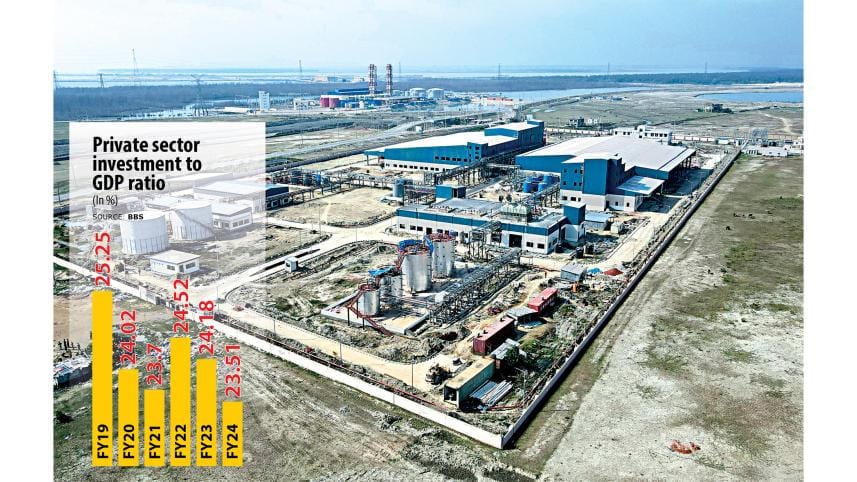Private investment slows as confidence takes a knock

Private investment as a percentage of Bangladesh's gross domestic product (GDP) has been declining for the past three years due to low investor confidence amid global crises, a persisting US dollar crisis and high inflation.
The private investment to GDP ratio lost 0.67 percentage points year-on-year to stand at 23.51 percent in fiscal year 2023-24, according to Bangladesh Bureau of Statistics data.
With the country already facing slow growth, the recent month-long student protest that culminated in the resignation of Sheikh Hasina from the post of prime minister has created another concern for the economy.
The protest brought economic activities to a standstill since mid-July as a curfew was enforced across the country to contain unrest.
However, the imposition of a curfew and the government's move to implement an internet blackout painted a grim picture for private investment as Bangladesh was disconnected from the rest of the world.
The imposition of a curfew and the government's move to block the internet have painted a grim picture for private investment as Bangladesh was disconnected from the rest of the world
Although the country witnessed the formation of an interim government, it will likely face challenges in speeding up private investment amid the existing economic slowdown.
"The recent political unrest definitely disrupted private investment," said Masrur Reaz, chairman of the Policy Exchange of Bangladesh.
However, it may lead to new opportunities for investors if better policies and fairness are ensured, he said.
"Foreign investors always want political stability to ensure the security of their investments. So, some of their fears may be eased in the aftermath of the protest despite the temporary disruption at present," Reaz said.
However, he criticised the internet blackout, which was aimed at reining in the student protests, saying it painted the country in a bad light, especially among investors.
"The complete cut off of communication might have raised many questions in investors and traders' minds regarding the country's business climate," he said.
Reaz also urged the authorities concerned to focus on ensuring good governance and working to improve the ease of doing business.
On July 28, the Foreign Investors' Chamber of Commerce & Industry (FICCI) met with Salman F Rahman, the former prime minister's private industry and investment adviser, to inform him of the monetary value of economic losses stemming from the volatility.
The recent shutdown has significantly impacted Bangladesh's economy, with losses estimated to be over $10 billion, according to the trade body.
"Numerous existing investors are currently in uncertainty as they aim to resume regular operations, but challenges and inefficiencies in releasing goods (from ports) and running operations are driving up the cost of business," said FICCI President Zaved Akhtar.
"If we fail to prioritise the ease of doing business, we will discourage potential investors from considering Bangladesh as a likely investment destination," he added.
The FICCI president also said investors are the most powerful advocates for attracting foreign direct investment.
"There has never been a more important moment than now to protect their needs," he said, urging the authorities to address the issues.
Bangladesh needs to overcome barriers to increase private investment, according to the Bangladesh Business Climate Index 2024, released by the Metropolitan Chamber of Commerce and Industry (MCCI) and Policy Exchange Bangladesh (PEB).
Year-on-year private sector credit growth fell short of the government target of 11 percent in June, it said.
In December 2023, it experienced year-on-year growth of 10.2 percent compared to its growth rate of 10.9 percent the previous year, it said.
Ashikur Rahman, principal economist of the Policy Research Institute (PRI) of Bangladesh, opined that investment possibilities have been generally undermined over the last three years due to the economic realities brought on by the Covid-19 pandemic and the Russia-Ukraine war.
Prolonged import compression, sharp energy price adjustments, steep currency depreciation and rising interest rates have deeply undermined the business climate, he said.
"These problems were amplified by increasing political uncertainty, acute governance deficits in the banking sector and frequent gas shortages," he said.
Overall, there has been a noticeable degradation in the investment climate, which policymakers have either not truly understood or accepted, he said.
Moreover, these issues need recognition before policymakers can articulate a comprehensive policy response, Rahman added.
He also said it was essential to underscore that while big businesses have found ways to communicate their problems with policymakers, small and medium enterprises have been left orphaned in this regard.
"This must change if we want a balanced policy response to address current pressures in the investment climate," Rahman added.
In the national budget for FY25, the government set a target to take private sector investment to 27.34 percent of the GDP, up from an estimated 23.51 percent.




 For all latest news, follow The Daily Star's Google News channel.
For all latest news, follow The Daily Star's Google News channel.
Comments